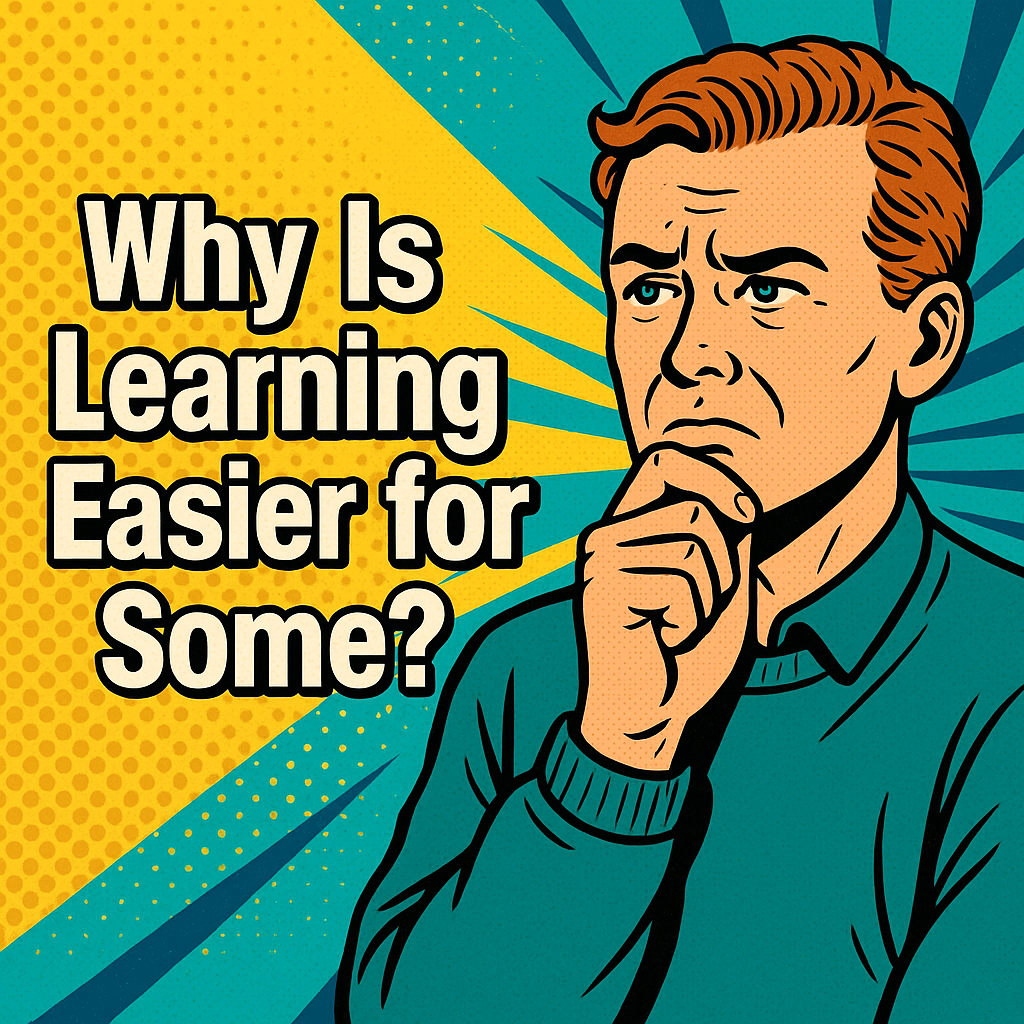Not Everyone Learns the Same Way — And That’s Your Advantage.
Why does mastering a skill feel natural to some and impossible to others? From childhood classrooms to adult passions, this essay explores the hidden forces behind talent, perception, and what it means to be a "slow learner" — with bold, digestible wisdom for the curious mind.

No time to read? Have a listen instead, click here
Have you ever watched someone pick up a guitar for the first time, strum a few chords, and actually sound good? Meanwhile, you’ve been practicing for months, and still sound like a confused raccoon in a trash can. It's frustrating, demotivating, and honestly — unfair.
But is it really?
Let’s talk about something we all feel but rarely say out loud: why do some people seem to be born with talent, while the rest of us are stuck sweating it out?
The Myth of the “Natural”.
It starts early. At school, there’s always that one kid who solves maths problems like it’s a game. Or the girl who speaks three languages without even trying. We call them “gifted,” “geniuses,” or say they’re just built differently. And maybe, to some extent, they are.
Aptitude — that is, a natural ability to do something well — is real. Some people’s brains are wired to understand logic faster, hear pitch more accurately, or visualise space more clearly. It’s like their mind has shortcuts where ours take detours.
But here's the twist: that’s not the whole story.
The Truth Behind Talent.
When we see someone doing something effortlessly, what we don’t see is the years of small habits, secret obsessions, or even the environment they grew up in. Talent may open the door, but practice builds the house.
Ever heard of the 10,000-hour rule? The idea that mastery comes from doing something again and again? It’s been challenged over the years — but the message remains solid: deliberate effort changes everything.
Let’s take Marcus, for example. He could sketch portraits at age 10. His teachers called him a prodigy. What they didn’t see was that he’d been drawing on every surface in his house since he was four — napkins, cereal boxes, even the walls. His “talent” was really just obsession plus opportunity.
Comparing Kills Joy.
Here’s where things get dangerous. The moment we start comparing, we stop learning. You look at your classmate’s fluent English and wonder why you still hesitate. You hear a friend playing Chopin and feel embarrassed about your own simple melody.
But here’s the thing: comparing your Chapter 1 to someone else’s Chapter 20 is pointless.
Everyone learns differently. Some need visuals, others repetition. Some grow under pressure; others shut down. There is no one perfect brain. And maybe what comes hard for you will one day become your strongest skill — because of that very struggle.
The Power of Struggle.
Struggling doesn’t mean you’re failing. It means you’re learning. Neuroscience shows that the brain actually grows stronger through difficulty. Each mistake creates a new pathway. Each correction lays a brick in the foundation of future skill.
You know that feeling when you finally “get it”? When something clicks after days or weeks of not understanding? That’s earned knowledge. It sticks. It builds confidence.
And — let’s be honest — it feels way better than when something comes too easily.
Philosophy Knows This Too.
Even philosophers knew this pain. Aristotle believed that virtue isn’t something we’re born with — it’s something we become through action. And Nietzsche said: “He who has a why can bear almost any how.”
So maybe the question isn’t, “Why is this so hard for me?”
Maybe it’s, “What is this difficulty teaching me?”
Your Struggle Is Your Signature.
So what if you’re not a “natural”? So what if others get there faster? The fact that you’re showing up, trying, failing, and trying again — that makes you unstoppable.
Because in the end, talent is nice. But grit, patience, and curiosity? That’s where the magic really lives.
Your journey might be slower — but it’s yours. And one day, someone will look at you and say, “Wow, you make it look easy.”
And you’ll smile — because you’ll know how hard it really was.
🔍 Glossary:
- Natural ability – when someone is good at something without needing to practise a lot.
Example: Some people have a natural ability to sing, even without lessons. - Frustration – the feeling you get when things don’t go the way you want.
Example: He felt frustration when he couldn’t understand the math problem. - The invisible ladder – a hidden way we compare progress, like a mental “ranking” of who is better.
Example: We often feel bad because someone else seems higher on the invisible ladder. - A slow burn – something that takes time to build up or develop.
Example: Her success was a slow burn, but it lasted. - Shortcut culture – when people want fast results without hard work.
Example: TikTok creates a shortcut culture where we want to be good at something right away. - Trial and error – learning by trying, making mistakes, and fixing them.
Example: He learned to cook by trial and error. - Late bloomer – someone who succeeds or improves later than others.
Example: He didn’t speak English well at first, but now he’s fluent — a real late bloomer. - Comparison kills joy – when comparing yourself to others makes you feel worse.
Example: Don’t look at their progress — comparison kills joy. - Crack the code – to finally understand something difficult.
Example: After many tries, she cracked the code of how to solve the puzzle. - Learning curve – the time and effort needed to learn something new.
Example: The learning curve was steep when he started his new job. - Your own pace – the speed that is right for you.
Example: Take your time and go at your own pace. - Self-worth – how valuable and good you feel about yourself.
Example: Failing once doesn’t mean your self-worth should drop.



